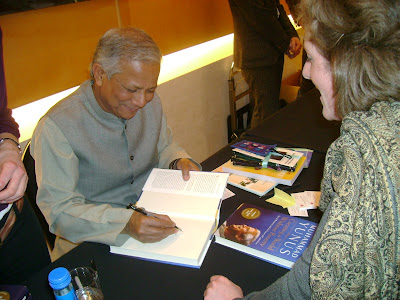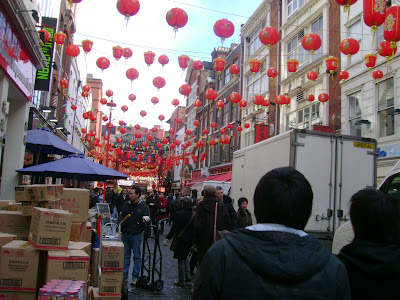
Tanzania president
KENYA: LORD MALLOCH BROWN INTERVIEW ON BBC RADIO 4, WESTMINSTER HOUR (10/02/08)
Interviewer: From his earliest days as Prime Minister, indeed before that as Chancellor, Gordon Brown's been intent on proving Britain's credentials as an international leader, and before him Tony Blair too. Remember back in 2005 when the UK had the presidency of the G8 and promised to make tackling poverty and corruption in Africa a priority?
Well as we watch the horrors of the intertribal killings in Kenya and the renewed attempts by Kofi Annan to broker agreement between the warring politicians the question is whether the international community and the UK should have been prepared to do much more much earlier.
Lord Malloch Brown, Kofi Annan's former Deputy at the United Nations, was brought in by Gordon Brown as a Foreign Office Minister. One of his responsibilities is Africa. I asked him whether countries like Britain should have been much tougher on the Kenyan Government in recent years because there were many complaints about corruption and mismanagement even before December's disputed elections.
Lord Malloch Brown: I think we've got to understand that aid which is if you like our main instrument is a pretty small one in a successful economy like Kenya's, it's about four per cent of GDP and rather more of course of that than Government spending, but this is an economy which has been buoyed up by high levels of private sector investment and growth. All of which go to the fact that despite the very real problems of corruption on which several High Commissioners, British High Commissioners in Kenya, made themselves famous or infamous depending on your point of view for the level of condemnation that (indistinct) despite that there was a lot economically going right with the country.
Interviewer: But that has led us to where we are now so the economic situation couldn't prevent the tribalism which some say has just been given a catalyst to break out in to this ethnic conflict because of those disputed elections last, in December.
LMB: Yeah I think the elections were a trigger for long standing grievances and inequalities which, you're right, had been exacerbated by growth. And I think the real lesson here is, not just for us the outsiders but for African Governments, that they've got to find a model of both inclusive groups, growth, so that all groups in society benefit but also of a really robust democratisation where not only are elections not stolen but where people feel that they have a chance to participate in the decisions that affect their life on a continuing basis, because you know here there were two striking political facts. One, it's a winner take all system and that meant that those in power were afraid of giving it up and of being wiling to bring the country to its knees to resist having to give that power up. And the other is that very large groups of the country feel totally excluded from formal power.
And you've kind of got to address that, you've got to distribute (indistinct) power more widely, and that's why Kofi Annan and others have been calling for constitutional changes, and create a sense of parliamentary accountability between elections so that every five years you don't have this kind of winner takes all desperate throw of the dice where the losers are consigned to five more years of powerlessness.
Interviewer: Those are absolutely understandable aspirations but haven't we heard this before, the Government strategy towards Africa in 2005 for example when the UK had the presidency of the G8? Then you heard the Government saying it wanted to tackle poverty and corruption in Africa but look what's happened since then.
LMB: Well I think a lot of interesting change is going on in the continent and some is bringing you know a growing strengthening of democracy but others it's putting real strains and tensions on it just because you know growth and change is exacerbating old tensions.
But I must say I, I took stock of this with a group of African experts who I invited in to the Foreign Office last week and the one common piece of advice they had to me was don't give up on pressing for democracy and corrupti, and, and the fight against corruption. These are not goals where you're going to succeed a hundred per cent overnight, they require you to continue pressing them probably through a generation or more, but they are the absolute beacons of hope for ordinary Africans.
And I think people therefore respect the fact that we have refused to accept this election result in Kenya, pressed for a more honest outcome, despite the fact that Britain has a lot of economic interests in Kenya. We have a lot of tourists who were looking forward to their winter holidays there, all of whom would love things to go back to normal as quickly as possible. But I think for everybody's sake it's really important that Kenya confronts and addresses the root causes of this and that outsiders like Britain press for them to do so.
Interviewer: But what pressure can we exert on them and why isn't the Government speaking out more loudly about it? Why is it diplomacy behind the scenes?
LMB: Well you know I'm pretty much you (indistinct) you, you know responsible for a, a, a lot of that approach and you know I'll tell you whenever we speak out too loudly in Kenya since the elections immediately one side tries to use this as a kind of red herring to take the debate away from who stole the election to, oh there they go again, the British colonial power is, is, is getting involved and trying to twist things in favour of certain ethnic groups at the expense of others, and all these old myths and ghosts resurface. So we do have real leverage, knowledge and influence in Kenya and tremendous interests and stakes there and we can use those extremely powerfully in a discreet way to get change.
And you know I spoke to Kofi Annan a little earlier today and found Gordon Brown had just called him just before I had. I mean we are extremely involved but you know it's, it's, it's not standing on the steps of Number Ten or outside the Foreign Office with daily briefs to the media Britain's demanding this, that or the other because that kind of public megaphone approach is highly counter productive.
Interviewer: Interested to get you views on what's happening in the United States. When you were at the UN you weren't exactly a great friend of, of President Bush, you spoke out against Iraq, you, you made your views known. Now we're in a situation where there could be big changes in American foreign policy for example when President Bush goes. Do you think that we'll see those changes?
LMB: Well I think it's, it's, it's not always the case that elections you know there's, there's a (indistinct) in advance of them there's a much advertised U turn forecast in foreign policy but in every country, Britain, the US, any democratic country, national interests are long run, and you know actually usually the story is of quite modest adjustments in policy as a (indistinct) as a result of elections. So I think people may be surprised that there aren't more changes.
But second you know whoever wins you, you, of the three likely Presidents now, Hillary (indistinct) Clinton, Barack Obama or John McCain, all of them are veteran internationalists in different ways with a real interest and knowledge of the world. And so I think you will see a very if you like difference of tone even if in some ways policies themselves may not have changed as much as people expect.
Interviewer: Your belief is then that changes in foreign policy won't be as dramatic as some people are expecting whoever wins?
LMB: Well I think not although there are quite a few issues where change will be pretty important, on, on climate change all three candidates have you know taken pretty bold positions, on, on Iraq obviously there's a big debate about things, but on, on, on many other issues, such as ...
Interviewer: Afghanistan, what about that?
LMB: ... Afghanistan, Darfur, many other issues around the world, I think the, the, change will be less than people expect.
Interviewer: Lord Malloch Brown.
vacancy
The Pan-African Parliament wishes to announce vacancies for various positions at its Headquarter based in Midrand, Republic of South Africa. The Pan-African Parliament request all applicants from AU Member States to send detailed CVs in accordance with the format indicated. The Parliament further encourages all applicants to forward their respective application directly to the following addresses:
The Clerk of ParliamentPan-African ParliamentGallagher EstatePrivate Bag X16Midrand 1685JohannesburgRepublic of South AfricaFax: +27 11 545 5136E-mail: pap-recruits@panafricanparliament.org


 Mr Bush had thrown his weight behind a possible power-sharing deal between President Mwai Kibaki and his chief opponent, Raila Odinga, as a way out of the political impasse.
Mr Bush had thrown his weight behind a possible power-sharing deal between President Mwai Kibaki and his chief opponent, Raila Odinga, as a way out of the political impasse.

























































